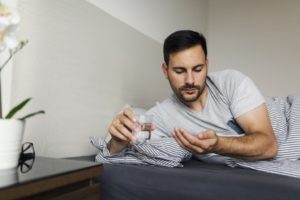
Do you struggle to fall asleep at night? Many people with sleep apnea do. To help them drift off, they may occasionally (or regularly) use sleeping pills. Such pills can relax your mind and spare you from tossing and turning in bed for hours before you finally get some shuteye. They might seem like an ideal way to help your body get the rest it needs. But are they? Well… no, they are not, especially if you have obstructive sleep apnea (OSA). Let’s talk about why individuals with OSA should stay away from sleeping pills.
What Do Sleeping Pills Do?
There are lots of different sleeping pills on the market, ranging from prescription medications to basic supplements that you can buy over the counter. Some people even use products that are not marketed as a sleep aid but that have drowsiness as a side effect to help them fall asleep. It is also possible to use melatonin supplements, which increase your body’s level of a hormone that plays an important role in inducing sleep.
Regardless of which product you use, you can expect a similar result. As the medication takes effect, it causes your mind and body to relax, lulling you into sleep. Unfortunately, the relaxation effect extends to the tissues in the throat that are responsible for causing airway blockage in patients with sleep apnea. As a result, you may experience longer or more frequent pauses in breathing. The quality of your sleep can greatly suffer, leading to increased daytime exhaustion and a range of other unpleasant symptoms.
Another big caution to keep in mind is that some sleep aids can be habit-forming; many people who regularly use them find that it is almost impossible to fall asleep without them.
What to Do Instead of Taking Sleeping Pills
Here are a few things you can do to improve the quality of your sleep without using sleeping pills:
- Talk to a medical professional. This is especially important if you are dependent on sleep aids or you suspect you have an undiagnosed sleep disorder, such as insomnia or sleep apnea. A doctor can help you get proper diagnosis and treatment.
- Do breathing exercises. There are several different breathing techniques that many people use to help them fall asleep quickly each night. You can read more about them here.
- Make your bedroom as comfortable as possible. A high-quality mattress and pillow, clean surroundings, and blackout curtains can ensure that your bedroom’s environment is conducive to good sleep.
- Seek mental health care if necessary. If anxiety is preventing you from falling asleep, a mental health professional may be able to help you achieve a calmer mindset.
Sleeping pills may help you fall asleep — but they are not right for everyone, particularly people with sleep apnea. Finding other ways to fall asleep is the best way to make sure you get the rest you need.
Meet the Sleep Apnea Expert
Dr. Mitch Conditt is an experienced dentist who specializes in helping people conquer sleep apnea through oral appliance therapy. He is a member of the American Academy of Dental Sleep Medicine and the Academy of Clinical Sleep Disorders Disciplines. If you suspect you have a sleep disorder, Dr. Conditt and our team can help you arrange for appropriate testing and treatment. Contact us at 817-527-8500.
